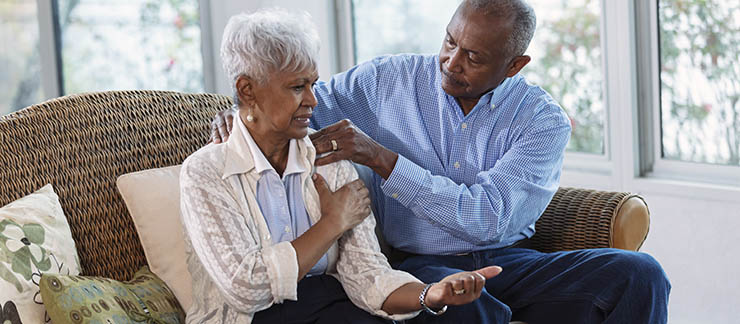
4 Tips to Help Seniors Manage Arthritis Pain
The stiff, aching joints of arthritis can limit mobility for older adults, causing pain that can worsen as they age. Arthritis can make tasks like bathing and cleaning—and joys such as socializing—extremely difficult.
More than 100 types of arthritis exist, but the two main types are:
- Osteoarthritis
Osteoarthritis, the most common form of arthritis, happens over time, usually in older people. The bones’ protective tissue, called cartilage, can wear down with age, causing stiffness and pain. - Rheumatoid arthritis
A disease in which the body’s immune system mistakenly attacks the lining of joints. Symptoms include pain, swelling, and stiffness in the joints.
Both arthritis types tend to make seniors feel sore and stiff in the morning. Getting out of bed can be a challenge for seniors due to inflammation and poor joint lubrication.
Related reading: Common Types of Arthritis in Seniors
4 Tips to Help Seniors Manage Arthritis Pain
Assistance, time, and understanding are needed when dealing with arthritis pain. Stiffness can last an hour or longer after waking in the morning, impacting everyone’s daily plans. With careful scheduling and adhering to the tips below, you can help minimize the effects of arthritis on your senior’s quality of life.
- Heat or Cold Therapy
One of the most effective therapies for arthritis pain is also the simplest—heat. Research has shown heat can help loosen stiff joints and relax aching muscles.
When heat is applied, blood vessels become larger, allowing the blood to carry more oxygen and nutrients to the area. Try a warm shower (92-100 degrees Fahrenheit), an electric heating pad, or a warm compress for arthritis pain relief.
Be careful with heat therapy. Seniors with poor circulation may not be able to determine the level of heat on their skin, which could cause injury. A warm temperature is the best and safest.
Cold therapy can also help reduce arthritis pain. Constricting blood flow with cold can reduce inflammation. If using a cold pack, make sure to avoid direct contact with the skin. Soaking stiff hands in a cool bath for 3-4 minutes and over-the-counter ointments help some seniors, too.
- Exercise: Get Moving to Get Results
Research has shown that physical activity is one of the best things you can do for arthritis. Physical activity, even gentle motions such as opening and closing one’s hands, can reduce arthritis symptoms and relieve anxiety and stress.
The Arthritis Foundation recommends these evidence-backed activity programs for adults with arthritis:
- The Arthritis Foundation Aquatic Program
- The Arthritis Foundation Exercise Program
- Active Living Everyday
- Enhance®Fitness
- Walk with Ease
- Tai Chi for Arthritis
- Yoga for Arthritis
- Reduce Inflammatory Foods
You can help your senior reduce inflammation and improve joint pain by monitoring their diet. The Mediterranean diet, which prioritizes whole foods like fruit, vegetables, fish, nuts, and beans, is known to help fight disease and inflammation.
Avoid these trigger foods that can cause inflammation:
- Alcohol
- Aspartame (a sugar substitute), such as coffee sweeteners
- Gluten and casein
- MSG
- Sugar
- Omega 6 fatty acids, which are found in nuts, grains, and fish
- Refined carbohydrates, such as pasta, crackers, or bread
- Saturated fats, such as butter, eggs, pastries, or beef
- Trans fats, which can be found in processed foods like margarine, cookies, and french fries
- Anti-inflammatory medications: Mind the dose
Nonsteroidal anti-inflammatory drugs (NSAIDs)—such as ibuprofen (Advil, Motrin) and naproxen (Aleve)—can reduce inflammation and help relieve arthritis pain and stiffness. NSAIDs may provide some relief, but it’s important to consult your senior’s health care provider to determine optimal medication and dose.
NSAIDs pose some risks, including problems with digestion, allergies, kidneys, and an increased risk of heart attack and stroke. Cough and cold medicines and some prescriptions may contain NSAIDs, which can adversely interact with medications your senior may be taking, including those for high blood pressure, antidepressants, and blood thinners.
Talk with your senior’s doctor before starting NSAIDs, medications, or supplements to avoid interactions and unwanted side effects.
Related reading: Safety Tips for Seniors Living With Arthritis
Scheduling Around Pain Patterns
Watch for patterns with your loved one’s arthritis pain. Everyone is different. Your senior may feel more pain in the morning or at night—or both. These patterns can help you schedule tasks like bathing, social visits, exercise, and appointments for the times of day when your loved one is most mobile.
Your Visiting Angels caregiver will schedule activities and other necessary requirements at your senior’s residence to ensure they are as comfortable as possible.
Home Care Can Help Your Senior Manage Arthritis Pain
Managing arthritis pain in seniors requires a comprehensive approach that combines lifestyle adjustments, proper medication, and supportive in-home care. Seniors can find relief and improve their quality of life despite arthritis.
However, if your senior needs professional home care, Visiting Angels offers compassionate and personalized assistance tailored to their unique needs. Our caregivers provide physical support and emotional companionship, ensuring your loved one receives the dedicated care they deserve. You’ll be comforted knowing your loved one is in capable and caring hands.
Contact us today to learn how we can help.


